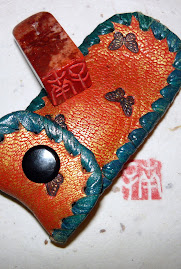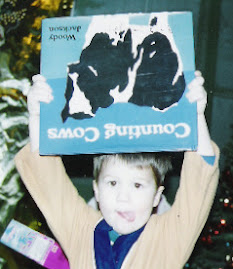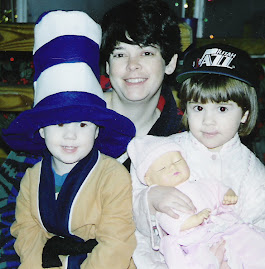Can't help wondering...what you're wondering about when it comes to who abuses children...and why they do it? And who can do the most to protect children from abuse...and why they don't?
Generally speaking it isn't some crazed monster wearing a black hood, wielding a bag of drug-laced candy in one hand and digital camera in the other who abuses a child. No, regardless of the type of abuse, the abuser is almost always some friend or family member, some person regarded as a "nice" person who is never suspected until too late...and so forth. In the majority of cases the abuser is a primary caretaker... mother, father, sibling et al of similar ilk. Child abusers come from all socio-economic levels and vocations. There isn't any simple profile...no one-size-fits-all archtypical child abuser.
Identifying an abuser before serious damage to the child leads to suspicions, reports, and frequently ineffective action is difficult, to say the least. Since the most and the worst abuses occur against children less than five years of age, and the majority of them, less than one, the odds are against the child speaking out or seeking help. Silent partners in abuse cases usually turn out to be so intimidated they aren't likely sources of help for the child either. So realistically who is left to speak out for the child? To seek help for the child? To do anything to protect the child?
Mysteriously56 blog comments in The Home Visiting Program Falls Short of Goal to Prevent Child Abuse article... that the "researchers found that mothers with higher levels of depression were up to three times more likely to severely physically assault their children than those with little or no depression. Mothers with no partner and those in violent relationships were up to six times more likely to severely assault their [children] compared to those in nonviolent relationships." And Dr. Melissa Clouthier offers some interesting thoughts on theconnection of Nature and Nurture in relationship to depression that contribute some insight into why this all relates to child abuse. But regardless of who abuses or why, important questions remain... who are those who will speak for the abused child? Where are those who will protect the abused child? Why aren't they protecting more children now? When will they? What can change the present situation to ensure better future protection for all children?
Theoretically the professional or para-professional who is trained to recognize and identify children-at-risk could be a first line of defense. However, "A highly lauded and widely adopted program that relies on home visits by paraprofessionals to promote effective parenting in families at risk of child abuse succeeded in building trust, but neither prevented abuse nor reduced known risk factors, according to results of a study directed by researchers at Johns Hopkins Childrens Center."
That's a major disappointment to many. I remember when this program began in the early 90's. I remember the high hopes (..and high hype!). I remember wanting to believe this project could lead to an answer to the same question still being asked...what can be done to minimize risk for identified at-risk of abuse and neglect children.
Well, in a sense the program and this report do provide an answer...but the answer isn't the one I wanted even though I admit it isn't one that surprises me. The question that remains for me is whether the program had to fail due to inherent flaws, or whether the program had to fail because the same problems that surface in all such programs contributed to the results disclosed by the researchers. "Insufficient training...lack of formal coordination between the home visit programs and community resource organizations, and poor record keeping" contributed to the problems. Ineffective supervision, failure to identify risks or direct families to community resources and other similar weaknesses doomed the program more than any flaws in the program itself.
Ultimately though, I think what most contributed to the failure of this and many other programs is a common human trait... "Program leaders and staff were very passionate about their work and really believed they were preventing child abuse." This desire to believe frequently leads to denial of the obvious when it conflicts with maintaining an ego image of oneself! And isn't that true for could-be, would-be, even those who are active child abusers?
Afterall, we've all heard that the road to hell IS so often paved with good intentions... How many new parents aren't "passionate" about being parents? How often do you hear "Oh we have the best baby, no problems, never cries...we must be doing something right!" They bubble over with parenting advice and secret or not so secret opinions that other parents, especially their own, did it wrong, but they won't. They "really believe" their own passionate desires represent future success. When reality suggests otherwise it's easier to deny reality than it is to evaluate their own parenting... or in the case of the program, the "work" or "prevention" etc.
Talk to any new child-welfare worker, from volunteer CASA to new Family Court Judge, and everyone in between, and you find that same passion and enthusiasm...and an unwillingness to consider that what they are doing, how they are doing it, and sometimes even why they are doing it, isn't producing the results intended. Those who cannon maintain the level of denial necessary to continue that passion and enthusiasm "burn out" and leave, or for reasons that have nothing to do with the children relying on them for help, remain in the field with bitter attitudes, convinced that what they do is "right," would be effective... if only the "other" would do what is "right" and not screw everything up by being true to stereotypical expectations. The other of course usually is the child abuser.
So what's the answer? Who is the most likely person to have knowledge of child abuse, and both the incentive and the determination to seek help for the child? The answer I propose won't be favorably received. However, I hope it will be openly considered as I pursue this idea further in the days to come. I believe the most likely candidate to protect a child from abuse is the abuser. And sadly, I believe the "system" that exists today creates circumstances that make that help for the abused child virtually impossible as an achievable possibility.
A Child is Waiting,
Take care...be aware.
Tuesday, October 9, 2007
Who are the "Bad, weird and wrong people" that abuse children?
Everyone wants to know
why bad, weird, and wrong people happen.
From: Mysteriously 56 Blog
Posted by
Child Person
at
12:52 PM
![]()
Labels: Abuser types, Depression, Dr. Melissa Clouthier, Home Visiting Program, John Hopkins Research, Mysteriously 56
Subscribe to:
Post Comments (Atom)

















No comments:
Post a Comment